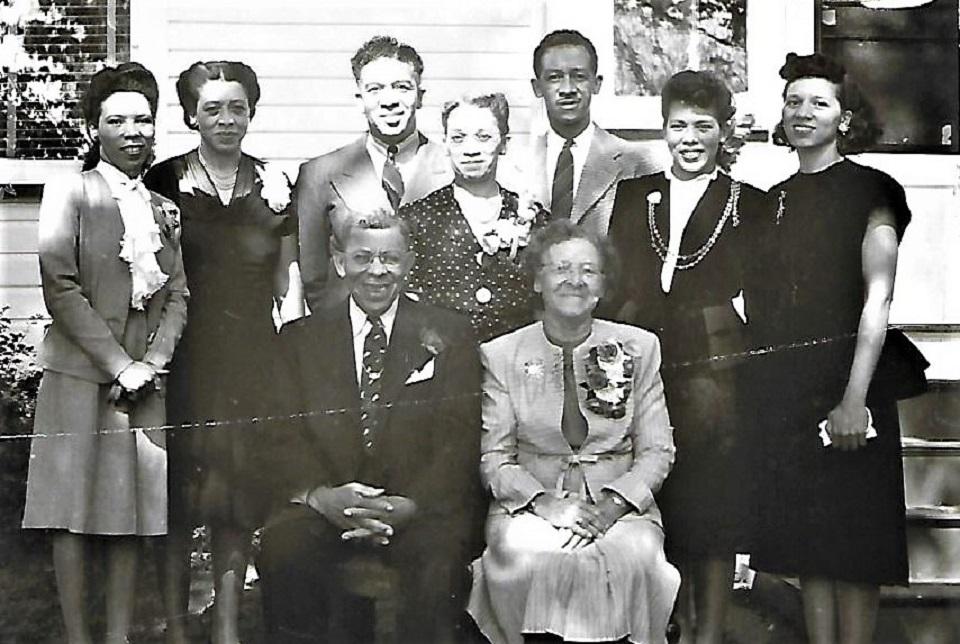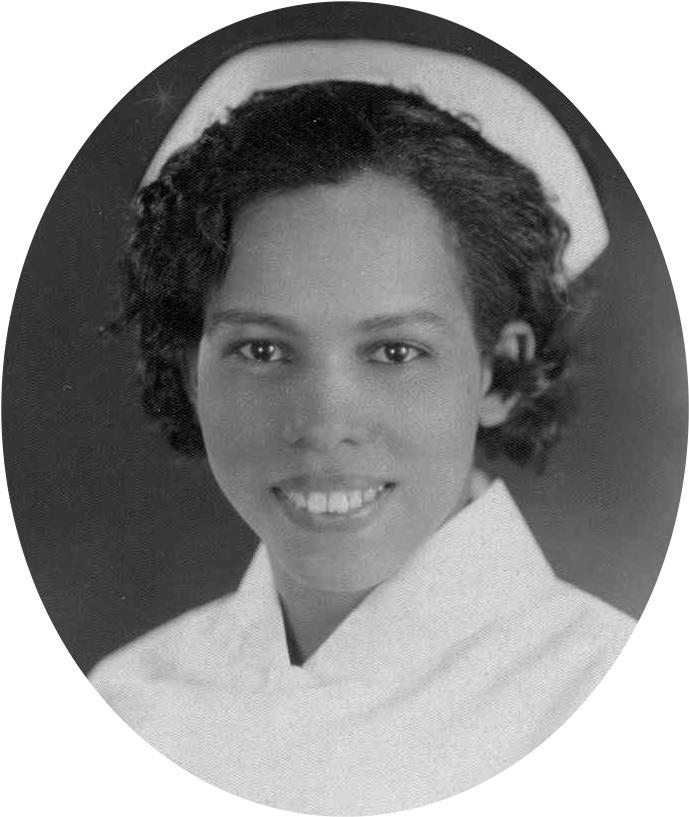Part 5 – Burma Journal – April 1945 to October 1945
April 1945
Winter is not over and spring is not yet here. The severe weather conditions in our “hospital in the sky” are beginning to wear on all of us. The good news is that I am in the next group granted rest leave. Sylvia Lasser is a nurse who just returned from leave in Darjeeling, India. While on leave, she stayed at Hotel Mount Everest. She told us about spending days playing tennis, horseback riding, and going to dances with American and Canadian flyers based in the area. I have never played tennis or ridden a horse, but I can dance. I can’t wait to try all three. Last week we were honored by a visit from the Theater Surgeon. We were all proud to learn that he was pleased with the work we were doing and the progress we have made.

Family photo of Olive with her parents at their 50th wedding anniversary. Front row, left to right, are Gladys, Marguerite, Wilbert, Ethel, Kenneth, Olive, and Marian. Front row, left to right, are John and Mary Lucas.
May 1945
My rest leave was wonderful and I enjoyed all of it. But, now I am back at the 335th and up to my elbows in-patient care. It seems like the change of seasons has resulted in more patients with more serious issues. We have a patient with scrub typhus. I don’t think I have ever seen a patient who was sicker than this soldier. He is on the mend and expected to survive. I am just grateful that we are able to keep him isolated enough that it has not spread through the wards. The visit from the Surgeon General has resulted in each of the nurses at the 335th being promoted to 1st Lieutenant. We believe our promotions are well deserved.
July 1945
Our patient census has dropped significantly over the summer. With the patient census this low, it makes me concerned about the rest of our tour here. We are living in harsh conditions and that is okay when we are busy doing what we are trained to do, but the thought of slow times with little work is very worrisome. My roommate, however, assures me that with our daily load of injuries from construction of Ledo Road we will surely be busy for many more months. We have been told that the goal for the Ledo Road is to connect India, China, and Burma and allow supplies to move more quickly to China where they are needed for the fight against Japan. That being the case, she may be right in her prediction.
September 1945
Word has come down that we are beginning the inactivation of the 335th Station Hospital.
Our job is no longer caring for patients, our job is now to take apart the hospital we put together just a year ago. At least this will keep us busy now that our patients have been moved on to their next medical facility. We are directed to inventory, box up, and label all hospital equipment and medical supplies. Rumor has it that some of the hospitals in other areas have done that huge job of packing up only to have those boxes and crates of supplies dumped in the ocean. Apparently, it would cost too much to ship it all back to the States. I hope the rumors are wrong, all of these supplies would be greatly appreciated by the local hospitals here in Burma, as well as in India.
Packing is not the only thing occupying our time, thoughts of home are filling our days. Going home, there is so much to consider. I will be so glad to be back home, glad to see my family again, glad to resume my life and career back in New York. This past year has been such a challenge, sometimes a little frightening, but I don’t know that I have ever learned so much in such a short period of time.
I never imagined that I would be a part of a group where I would have the chance to work with people from all over the world. Working as a team, being a valued member of the team, and being recognized for my particular skills has given me renewed confidence in my own abilities. One thing for sure, I intend to take advantage of the GI Bill to get my graduate degree. I am sure I will continue in nursing and I believe my Army experience has made me a much better nurse and that should make me qualified for jobs that will ensure career success, at least I hope so.
October 1, 1945 – 335th Station Hospital is inactivated. The personnel will leave from Karachi, India by ship, the General Morton. We expect to arrive in New York Port of Embarkation by Oct 23, 1945.
LEDO ROAD
Construction began in 1942 with 15,000 American troop members, 60% being African American. Along with the Black troop members, another 35,000 soldiers consisting of Indian, Chinese, and Burmese nationals, assisted in the construction of the road. The goal was to have the road begin in Ledo, India, cross over the Patkai Mountains (where passes were as high as 4,500 feet) and end at Kunming, China. By 1944, the road stretched 1,726 kilometers (1,072 miles), with 1,033 kilometers (642 mi) in Burma, 632 kilometers (393 mi) in China, and the remainder in India.
Epilogue
Olive was discharged from the Army Nurse Corps in 1945. After a visit home to see her family, she returned to New York and resumed her nursing career. She took advantage of the G.I. Bill and in 1949 she received her Bachelor of Science in Nursing at the age of forty-one and in 1951 she received her Master’s in Nursing Education at the age of forty-three, both degrees were from New York University.
Newspaper articles about her promotions over the years make it clear that she was successful in her nursing career. In May 1949, Olive is mentioned in a Column called “Bill Chase, Around Town” that ran in “New York Age Newspaper” on May 14, 1949. The columnist relates his story of Olive, “I suppose I have more than the usual right to be proud of the fact that Olive Lucas who holds a BS in public health was made assistant last Friday to the supervisor of nurses at Welfare Island Dispensary. You see Olive was my nurse in Harlem Hospital back in 1933 when I was run over and almost killed by a truck because I was foolish enough to go in for the roller-skating craze then in vogue.”
On Nov 20, 1954 the ‘New York Age Defender Newspaper” ran a story about Olive,“Harlem-Trained Nurse Gets City Hospital Job.” The story explains that Olive had just been named the first Negro Nurse to take over the Nurse Coordinator and Home Care department at City Hospital on Welfare Island on November 16, 1954. It is interesting to read how women are portrayed in newspaper articles of that time (see below).
After her retirement, Olive was active in the National Association of Colored Graduate Nurses.
Apparently, she was also very active in fighting city hall. This was a time of Urban Renewal projects in major cities. Her ride on the bus to city hall often involved conversations with other riders to let them know they needed to fight to prevent many of the neighborhood buildings being torn down in the name of progress.
Olive returned to her hometown of Meadville, PA after having a stroke. She recovered well from the stroke thanks to the care from her family. She spent her final years at Wesbury United Methodist Community, along with her brother, my dad Kenneth Lucas. Olive took an active part in the community and she especially enjoyed the music programs.
Olive was born on Halloween in 1908., The last year of her life she spent looking forward to her 100th birthday party. Sadly, she died 9 days shy of her 100th birthday. Her funeral was held on Halloween 2008. Her family and friends sang Happy Birthday and passed out bags of her favorite candy. I am sure Olive would have loved it.
Notes – April 1945 – Darjeeling Rest Leave – G.I. Nightingales, by Barbara Brooks Tomblin, pg. 163
May 1945 – Scrub Typhus – Army Nurse Corps History – Draft, v.10, 1987, pg. XV-10 – Promotions – Historical Report, Office of Surgeon, Headquarters, 30 July 1945, pg. 8
July 1945 – Ledo Road – https://www.pacificatrocities.org/blog/black-history-month-recognizing-african-american-efforts-in-building-the-ledo-road
Sept 1945 -Inactivation of 335th – Unit citation and Campaign Participation Credit Register, Dept. of the Army, Washington, DC 6 July 1961– Dumping Supplies – No Time for Fear, Diane Burke Fessler, pg. 250








